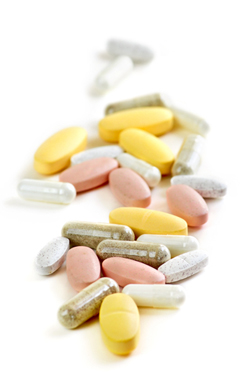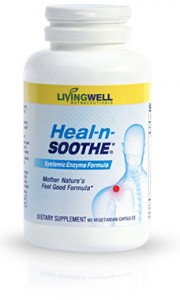Beware Before Taking These!
Not all of the essential nutrients you need to achieve optimum health are available in the foods we eat. That’s why natural supplements can be very effective–if they’re actually good for you.
You probably know that the Food and Drug Administration (FDA) doesn’t go out of its way to approve or verify claims about natural supplements because they’re considered “foods” not “drugs.” That’s not to say that “unapproved” supplements can’t be an excellent addition to your health.
But you should also be aware that just because something is “natural” doesn’t mean it’s good for you. That’s why you should compare the ingredients in the supplements you take with the list below.
While some of the 10 supplements below may have some benefits, you may want to reconsider taking them. Some of them have FDA warnings about serious health risks. Others have been outright banned in some countries. But they may still be found in your favorite supplement.
Typically, overdosing is the primary thing you should concern yourself with when it comes to standard vitamin and mineral supplements. Same with many natural supplements.
However, some supplements should be approached with a much higher level of caution. These usually seem to fall in these three categories:
- Body Building
- Weight Loss
- Sexual Enhancement
If you’re currently taking or considering taking one of these types of supplements, you should be especially aware of the following ingredients. Many have been proven dangerous, causing heart, liver and kidney problems among others.
Bodybuilding and Weight Loss Supplements to Avoid
Many dangerous bodybuilding supplements remain on the market. Manufacturers take advantage of people’s desire to gain muscle, lose fat and push hard during exercise that the risks of the ingredients they use is often ignored.
For example, in April of 2013, the FDA said it was using “all available tools at its disposal” to remove supplements containing dimethylamylamine (DMAA), a stimulant often used in pre-workout supplements. This dangerous chemical may also be hiding in your supplements as “germanium extract.” It is also referred to as methylhexanamine or 1,3 DMAA.
As a stimulant, DMAA increases blood pressure, which can lead to cardiovascular problems. Other consumers reported psychiatric and nervous system disorders. While the FDA is trying to remove products with DMAA off the shelves, you’ll still find these potentially dangerous supplements readily available in other products:
- Chaparral is used for weight loss. It has been shown to lead to kidney problems, liver damage and heart problems.
- Aconite is used to promote sweating and improve circulation. It is a poisonous herb that is unsafe in all applications. It can cause severe side effects such as nausea, vomiting, heart problems and death.
- Bitter orange is still used for weight loss because it contains synephrine–similar to the banned ephedrine–which can lead to irregular heartbeat, heart attack, stroke and death. It is especially dangerous when combined with caffeine.
Sexual Enhancement Supplements to Avoid
Yohimbe increases blood flow by raising blood pressure and was considered effective for erectile dysfunction and as an aphrodisiac, until severe cardiac risks were discovered. It is also found in bodybuilding supplements.
Country mallow — a natural source of ephedrine — fits into all three categories. Ephedrine is an amphetamine-like stimulant, so it was used for weight loss, erectile dysfunction, sexual arousal, and as a stimulant for bodybuilders. The FDA banned all sources of ephedrine in April 2004 because of the multitude of neurological dangers, including seizures, tremors and dementia.
You’d be hard pressed to find this as a supplement on its own today, but that’s not to say you shouldn’t watch out for it hiding in your other supplements.
Other Natural Supplements to Avoid
- Kava, an anti-anxiety herb, can seriously damage your liver. This herb is illegal in Germany, Canada and Switzerland.
- Greater Celandine, not to be confused with lesser celandine, is used most commonly for upset stomach and other digestive disorders. However, it causes serious liver disease and hepatitis.
- Coltsfoot was once considered the world’s oldest cough drop… until it was discovered to cause liver damage and cancer.
- Comfrey or blackwort is used for cough and heavy menstrual cycles, but also causes liver damage and cancer.
More Tips For Avoiding Dangerous Supplements
1. Do your research. Before you put anything in your body, talk to your doctor–especially if you’re taking prescription medications. But also do your own research. Google “[supplement] + risks” and see what comes up. And search for your supplement here on the Healthy Back Institute blog, and see if we have any news on it.
2. Always check the company out. See if they have telltale signs of being a “fly by night” store. How long have they been doing business? Are they registered with the Better Business Bureau, verified by Google as a Googleâ„¢ Trusted Store, or have other “customer certified” badges? These badges–and others like them–will be obvious on the website, usually at the bottom of the page. Look for a rock-solid money-back guarantee.
3. Is it “Made in China”? Please be cautious of supplements either made in China or with ingredients exported from China. The Chinese have been repeatedly caught with low manufacturing standards, ingredients that aren’t as pure as they say, and even exporting toxic materials.
4. Does it have excessive fillers, binders or other artificial ingredients? Fillers and other additives are used for a number of reasons:
- to make them easier to swallow,
- to mask the taste, especially in painkillers
- to keep the pills from sticking to each other or equipment
- to fill any gaps left in the capsule, making it look full
Some ingredients to look out for include magnesium stearate (stick-free), titanium dioxide (filler), artificial colors and hydrogenated oils.
Supplements That Are Definitively Safe
Despite the ever-growing list of supplements that are dangerous, there is a definitive list that most everyone would benefit from–and that the FDA “considers safe.” Here are a handful of those along with some of their more common usages:
- Calcium and Vitamin D3 — preventing osteoporosis
- Cranberry — reducing recurring urinary tract infections
- Fish Oil — EPA/DHA, Omega 3s — reducing triglyceride levels and decreasing risk of heart attack
- Glucosamine Sulfate — reducing osteoarthritis symptoms
- St. John’s Wort — improving depression symptoms
- Pygeum — reducing symptoms of enlarged prostate
Other supplements from verified natural origins–such as proteolytic enzymes from fruit–with no reported serious side effects or risks can also be considered safe.
Proteolytic enzymes are excellent for reducing pain by fighting inflammation and the build-up of fibrin, improving digestion circulation, and reducing swelling.
In fact, after extensive testing we’ve found proteolytic enzymes to be among the safest and most powerful natural pain relieving supplements available.
If you’re taking conventional pain killers – even over-the-counter drugs – to manage your pain, please take a look here to see why you should stop now… and how to get safer pain relief from proteolytic enzymes.
Discover How to Replace Dangerous Painkillers
with All Natural – and SAFE – Proteolytic Enzymes
References
Stimulant Potentially Dangerous to Health, FDA Warns. U.S. Food and Drug Administration: Consumer Updates. 22 Apr. 2013.
Dangerous Supplements: What you don’t know about these 12 ingredients could hurt you. Consumer Reports: Natural Health. 2010 Sept.




Evidently Fish Oil may not be safe to take after all.
Thank you for the valuable infor on dangerous supplements. It is appreciated. L
Your article about dangerous supplements was much appreciated. Keep the useful info coming!!
Re. Billy Miles’ post on fish oil above, I have a friend who is 92 years old, and the only supplement she has ever taken throughout her life is cod liver oil. She has no health problems whatsoever and is a living miracle! Mind you, I don’t suppose there were all the problems with mercury in fish for much of the time she was taking it!